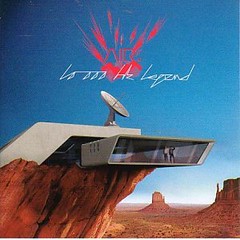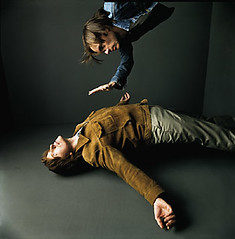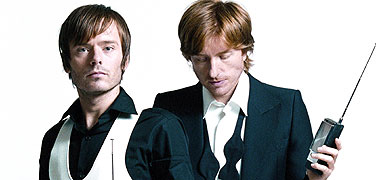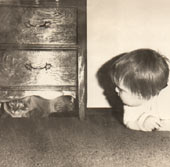 Air - 10,000 Hz Legend
Air - 10,000 Hz Legend
Astralwerks (2001)
When Air first arrived on the pop music scene, their sound was described earnestly by some as elevator music, and fit nicely in the niche of groups making so-called "space-age bachelor pad" music. That term was made most famous by Juan Garcia Esquivel, master of high-fidelity easy listening epics, who enjoyed a resurgence of interest in his work in the mid-nineties thanks to a Matt Groening-approved compilation and an appearance on the soundtrack to Four Rooms, which featured music from Esquivel acolytes Combustible Edison. Stereolab revived the phrase for their album The Groop Played "Space Age Bachelor Pad Music", Capitol Records cleaned their vaults with their staggering 18-volume Ultra Lounge series, and even the Beastie Boys got in on the act with their one-off fans-only disc The In Sound From Way Out.
Air's debut album Moon Safari coasted in smoothly on the ebb tide space-age bachelor pad music's popular revival. It floated on a plush cloud of vintage Moog synthesizers and Fender Rhodes, occasionally trimmed with french horn flourishes cribbed straight out of Burt Bacharach's wet dreams. The French duo that made up Air, Nicolas Godin and Jean-Benoît Dunckel added a touch of icy Euro-cool to their tunes with their gently cooing Gallic voices, often run through a vocoder. The lush, atmospheric sounds and moody instrumentals of Moon Safari sounded perfect for a film soundtrack, and appropriately, Air's next effort was the soundtrack to Sofia Coppola's debut film The Virgin Suicides. The EP Premier Symptomes collected their early singles, showing how they first learned the formula for rocking a french horn and a Moog in the same song, making slow-burn bliss-outs like "Le Soleil est Pres de Moi" sound like an anthem of mellow joy.
Godin and Dunckel strayed sharply from the space-age course with their third full-length album, 10,000 Hz Legend. The cover of the record seemed to depict the two gazing from a literal space-age bachelor pad perched high above Monument Valley, but the songs within could hardly be described as easy listening. The opening track sets the tone: "Electronic Performers" features a voice vocoded so heavily that it sounds less like the mellow tune-bots of Moon Safari and more like a robot grown a little weary from tinkling the mellow ivories:
We need to use envelope filtersThe next track, "How Does it Make You Feel," would not sound out of place on Moon Safari, what with its softly intoned Fender Rhodes chords, sweetly soaring chorus, and intimately romantic lyrics, that is, if those romantics lyrics did not sound as though they were sung by a robot with the voice of a frog:
To say how we feel
Riding on magnetic waves
We search new programs for your pleasure
I want to patch my soul on your brain
BPM controls yoour heartbeats
We are the syncronizers
We are electronic performers
I am feeling very warm right nowAt the end of the track, a female robot voice provides the punchline and the answer: "Well, I really think you should quit smoking."
Please don't disappear
I am spacing out with you
You are the most beautiful entity that I've ever dreamed of
At night I will protect you in your dreams
I will be your angel
You worry so much about not having enough time together
It makes no difference to me
I would be happy with just one minute in your arms
Let's have an extended play together
You're telling me that we live to far to love each other
But your love can stretch further than you and I can see
So, how does it make you feel?
"Radio #1" is the next track and the only single from this record, sounding like a slightly-off ELO with the chorus "If you need some fun / Some good stereo gum / Radio #1 / Brand new ears at once / Eject musical trash / Radio #1." On the next track, none other than Beck Hansen drops by the bachelor pad, sounding elegantly wasted and moved by the signature moods evoked by Air:
Golden waves
In all directions
I could lose my soul right here
Colour lights
On the runway
Makes a stranger feel unchained
 "Radian," one of the two intrumentals on this record, is the only track on 10,000 Hz Legend that evokes the polish of Moon Safari. It does the space-age Moog music thing so well that it effectively answers those who wondered why this record couldn't be more like its predecessors. If Moon Safari and Virgin Suicides established Air as expert purveyors of instrumental space-age pop, then "Radian" was their capstone and ultimate acheivement in the form. It perfectly evokes a mood of quiet seduction, growing rapture, and the reflection and release that comes afterward.
"Radian," one of the two intrumentals on this record, is the only track on 10,000 Hz Legend that evokes the polish of Moon Safari. It does the space-age Moog music thing so well that it effectively answers those who wondered why this record couldn't be more like its predecessors. If Moon Safari and Virgin Suicides established Air as expert purveyors of instrumental space-age pop, then "Radian" was their capstone and ultimate acheivement in the form. It perfectly evokes a mood of quiet seduction, growing rapture, and the reflection and release that comes afterward.The next three tracks serve to dispel the almost coital bliss evoked by "Radian," and return the record to its dominant themes: weariness, disillusion, and clausterphobia, all antithetical to the groovy vibe so often ascribed to space-age bachelor pad music. "Lucky and Unhappy" has our boys reeling from the antiseptic removal of feelings that is the byproduct of fame. "Sex Born Poison" seems to describe the perils of sex between consenting robots:
Meet my desire sensorsIn "People in the City," Air takes a second to step back and look at their surroundings, and they find themselves in a claustrophobic metropolis straight out of Blade Runner:
My atom juice of joy
You want to use my affective circuits
Run to the fire exit
Use your cooling system
You'll never reach the 7th sky today
P.E.O.P.L.E.C.I.T.YAfter all that paranoia and malaise, Godin and Dunckel once again gleefully subvert the smooth Euro-cool image they gained from their earlier recordings on "Wonder Milky Bitch", flaunting the same oddball humorous streak that "How Does it Make You Feel" revealed earlier, and replacing that song's romance with naughty innuendo:
People in the city
P.E.O.P.L.E.C.I.T.Y
People in the city
Moving, watching, working, sleeping, driving, walking, talking, smiling
Moving, watching, working, sleeping, driving, walking, talking, smiling
On the sidewalk (People in the city)
Near the street lamp (People in the city)
At the bus stop (People in the city)
Down the station (People in the city)
This is the story of a country girlPairing a lurid jews harp with a dreamily strummed acoustic guitar, "Wonder Milky Bitch" provides an answer for anyone who ever wondered what it would sound like if Lee Hazlewood ever sang lead vocals for T.Rex.
Back in town from her country house
She came to me with her muddy boots
She destroyed all my carpet
You know how to do it
Wonder milky bitch
You never wear cosmetic
You don't like arithmetic
You know how to do it
Wonder milky bitch
Tasting, touching, swallowing me
Drinking me like bloody mary
10,000 Hz Legend goes out with a one-two punch. "Don't Be Light" could be interpreted as a statement of the album's ultimate objective, both by its title and its execution. It sounds as though Air is speeding away from the high-tech nightmare they had surrounded themselves with, alternating a rapid techno-derived synthesiser blips with raucous, overdriven guitar solos. They pause halfway through to observe the second cameo of Beck's Vagabond, returning from mellow cosmic voyage he set off for with Air's earlier help, now intoning an eerie epitaph:
Don't be light, don't be light, a-ha"Carmel Prisoner" serves as the second instrumental and final salvo on the strange, synthetic voyage undertaken by our French duo. We don't know if they made it out, but the title and the relentless technological throb of the song makes us think they have ended up lost in some endlessly repeating pleasure circuit.
Wild life
The grey surprises of our days
Singing in caves
Fabricating a new abandon
We don't see the master's hand
We bang on gold tamourines
In the cross hairs of some transient gun
Trading desires on the banquet line
La, la, la, la, la, laaaa....
10,000 Hz Legend was greeted with confusion by critics and fans who were once wooed by the smooth electronics of Moon Safari. Rolling Stone called it a "deranged dim sum of sound: Some of it is tasty, most of it is weird and, ultimately, you will never know what your ears are eating." Describing "Radian," it complained, "There's a palpable sense of wistfulness to the track, a moody blues that repeatedly surfaces on 10,000 Hz. Legend then disappears again. But this vague angst is the only thread that runs through every song, and when Beck drops by and ruins "The Vagabond" with the same minstrel-show Prince impersonation he sported on Midnite Vultures, one begins to wonder if this isn't a compilation of electronic performers instead of an album by one band....It's nice that 10,000 Hz. Legend sounds very little like Air's masterworks Premier Symptomes and Moon Safari. Unfortunately, it also sounds like Air trying very hard not to be Air." England's NME, giving the record a 9 out of 10 but seemingly praising it with faint damnation, said "There's nothing like gratuitously trashing your public image. If Air's debut album...established them as a byword for casual style-mag chic, then its successor looks like a brazen attempt to destroy that image for good. 10,000 Hz Legend is nothing like Moon Safari, then again it doesn't really bear a resemblance to much. Instead, it's a glowing, highly ambitious, quasi-concept album that sees Air spiralling off on a wildly idiosyncratic and brilliantly insane tangent all of their own."
While being a huge fan of Moon Safari and Premier Symptomes, as well as their most recent album, the less difficult and more Moon Safari-like Talkie Walkie, I still consider 10,000 Hz Legend to be Air's best album. My reasoning revolves around the concept of evolution, at least as much as one can apply evolution to pop musicians. Popular music is riddled with excellent debut albums. When an album is delightful and effective, it leaves listeners wanting more. What makes a band really great, in my estimation, is when a group takes the expectation and promise that comes after the release of their first records, and does something unexpected: evolves, adapts, and gets better.
Witness the evolution of many great pop musicians from one touchstone album to another: The Beatles from Please Please Me to the White Album; The Beach Boys from Surfin' USA to Pet Sounds; Lou Reed from Transformer to Berlin; David Bowie from Hunky Dory to Low; Ween from God Ween Satan: The Oneness to Chocolate and Cheese; Beck from Mellow Gold to Odelay and Sea Change.Similarly, 10,000 Hz Legend sees Air making a move in the direction of evolution, re-evaluating the sounds, moods, and themes of their earlier work, and in the process making a record that's smarter, more literate, edgier, and ultimately more exciting than the ones they made before.
 This is the kind of evolutionary process I want to experience happening to all the bands I enjoy. I want them to go from a great band to one that is truly outstanding. In my opinion, the great bands do this by taking what they do well, turning it around, and doing something totally unexpected with it. It is rare when this process works. On 10,000 Hz Legend, it works better than anyone who ever blissed out to the mellow sounds of Moon Safari could have expected.
This is the kind of evolutionary process I want to experience happening to all the bands I enjoy. I want them to go from a great band to one that is truly outstanding. In my opinion, the great bands do this by taking what they do well, turning it around, and doing something totally unexpected with it. It is rare when this process works. On 10,000 Hz Legend, it works better than anyone who ever blissed out to the mellow sounds of Moon Safari could have expected.

No comments:
Post a Comment